More than a taste of honey
Why all bees matter; a post for World Bee Day. A conversation with a honey sommelier, meeting a bee keeper and a recipe for honey panna cotta.

Happy World bee day. Why is it so important?
Set up by the United Nation, it’s a day to highlight the need for pollinators and the fact that bees are in decline. For many of us when we think of bees, our thoughts turn to honey but out of close to 20,000 species of bees only 7 of them are honeybees.
Here’s honey sommelier and wild bee expert Sarah Wynham Lewis;
According to the UN, World Bee Day ‘‘presents an opportunity for the world to recognize the role of beekeeping, bees and other pollinators in increasing food security, improving nutrition and fighting hunger as well as in providing key ecosystem services for agriculture.’’
Improving pollinator density and diversity boosts crop yields – pollinators affect 35 percent of global agricultural land, supporting the production of 87 of the leading food crops worldwide. Safeguarding bees safeguards biodiversity: the vast majority of pollinators are wild, but not all of them are bees. Other pollinators include moths, flies, wasps, beetles and butterflies. Vertebrate pollinators include bats, several species of monkey, rodents, lemur, tree squirrels and birds such as hummingbirds, sunbirds, honeycreepers and some parrot species.
I met honey sommelier Sarah whilst we were both judging the Great Taste Awards in Dorset. One of the reasons I love judging is the opportunity to taste incredible honey from across the world and to appreciate the multitude of flavours they offer up, with a circle of complexities and character, from sweet florals through bitterness to savoury and herbal notes.
Sarah spent 20 years as a journalist, writing about interiors food and wine. Although she is allergic to bees (and yes she’s all too aware of the irony), she accompanied her husband when he took a beekeeping course and as she says ‘ he got a glint in his eyes’. She adds; he’d come in, tell me about the bees and if you’re a writer, you ask questions. Sarah realised early on in his training that the one thing she could do was to understand more about what we should be planting to support pollinators, particularly in urban situations. As she says;
‘I made that one of my missions, then later on, I was doing all the honey lists, explaining what our varieties were, and someone approached me and said will you do an event as a honey sommelier.’
She found out that there was a course in Italy, but only in Italian. When she heard that it was being run in English she booked a place in Bologna to start the training.
I asked her about the course;
And how she works directly with bee keepers;
What happens when she’s tasting, what does she look for?
‘‘There is one word to hang onto, and that is blend’’
Does cheap honey exist? We’ve all seen squeezy bottles of golden honey that only cost a pound. I grew up with Gales Honey. Their website says they’ve been ‘sharing the simple beauty of honey since 1919’. Their product information says they use ‘A blend of EU and non-EU honeys’ The British Beekeepers Association talk about issues with mass-produced adulterated honey. The most prevalent problems including;
dilution with different syrups
harvesting immature honey
mis-labelling origin
Only 14% of the honey sold in the UK is actually made here.
Slow Food UK have this to say on honey;
Where commercial honeys offer only standardised, pervasive sweetness, single-source varietals offer authenticity, finesse and differentiation. Comparable to the difference between glorious, single-estate coffee beans and a jar of freeze-dried instant coffee granules.
Supermarket honey is cheap because it’s blended and often, it’s not honey at all. I ask Sarah what honey consumers should buy in supermarkets; her answer might surprise you;
She adds; if you buy from a beekeeper there will be a very clear chain of custody which isn’t there when you buy from a supermarket. She continues;
‘‘some supermarket honey may be many years old. It may have sat in warehouses, going through hot and cold cycles for years. It may be labelled as the product of one country when in fact it’s the product of another. It is such a corrupt business.’’
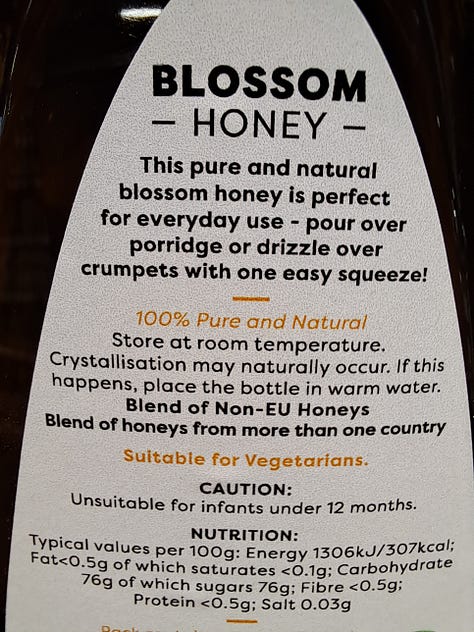
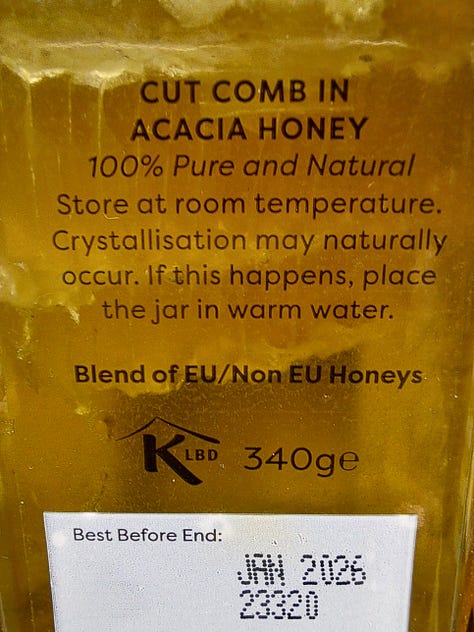

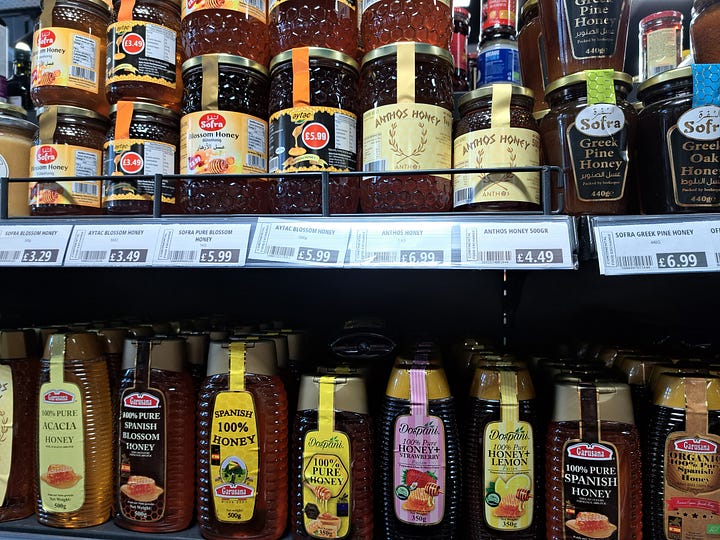

The UN publishes 6 reasons to BEE grateful on World Bee Day and one is to:-
Buy raw honey from local farmers. Many local smallholder farmers and forest communities maintain sustainable beekeeping practices. You can lend support by buying raw honey, beeswax or other bee products, directly from them.

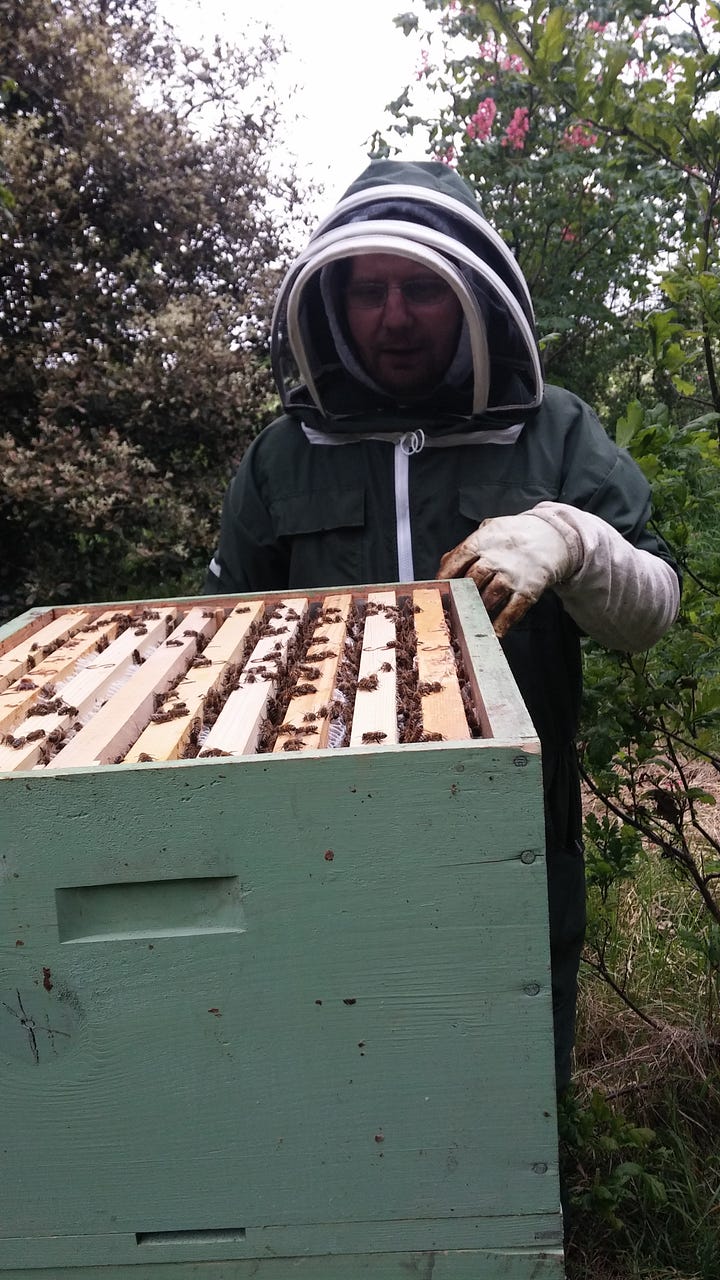

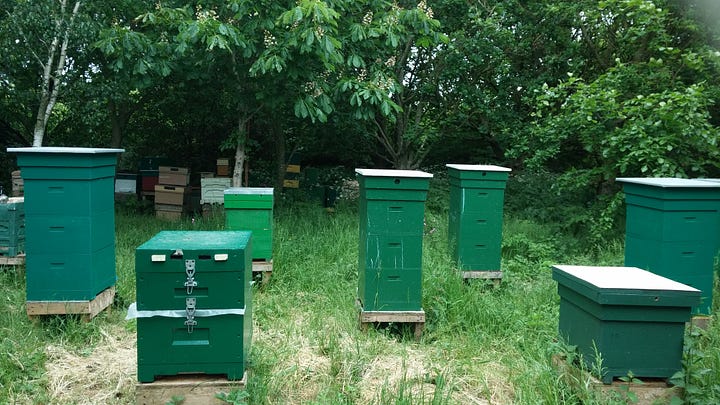
Ciprian Bretean’s grandparents started to teach him about beekeeping when he was 6 years old, growing up with his family in Romania. Years of experience, passed down from generation to generation.
I met up with him in Essex near Epping Forest where he keeps around 100 hives. The hives are well hidden from the main roads to protect them from damage and vandalism. On a warm spring day, the bees were out in force. Ciprian is clearly proud of his bees and the work it takes to look after them and the hives.
He ensures that their bees are regularly checked for disease and that their care and food sources are exceptional, especially during winter.
They don’t pasteurize or treat the honey they retrieve from their hives. It goes straight from the hive to the jar. His honey ranges from lightly flavoured borage and his spring flower honey, to heather which has a more complex, deeper flavour. He sells his honey from his website and at farmers markets in London, where he can advise, tell his story and give tasters.
For World bee day, Ciprian is keen to emphasise how important bees are, and as a beekeeper how he always tries his very best to take care of the colonies he looks after.
He adds;
‘‘Not everyone is a beekeeper, and we can still bring our contribution in taking care of their needs, even if we’re not directly in contact with them. The needs of bees are very simple: they need pollen and nectar in order to feed themselves and feed the brood, which will become the next generation. As long as there are flowers and some good weather, they will do the rest. Every garden, however small or big, can have flowers planted. Even if they are in the city centre, we should remember that bees can fly miles away from the hive in order to collect pollen and nectar.’’
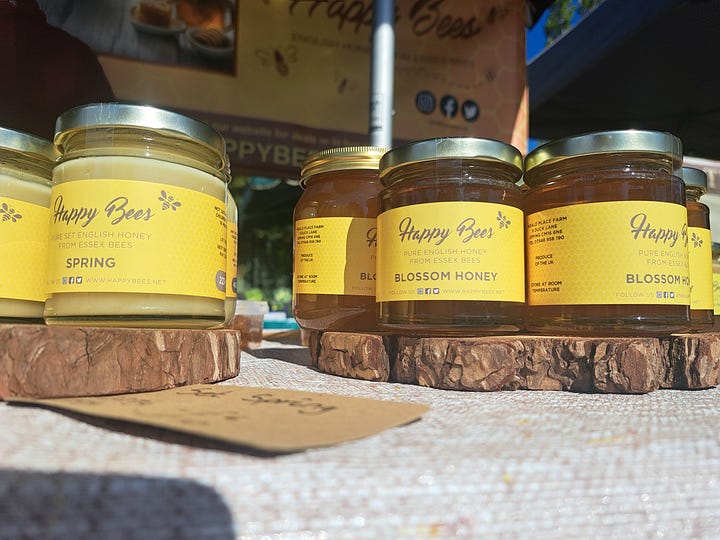
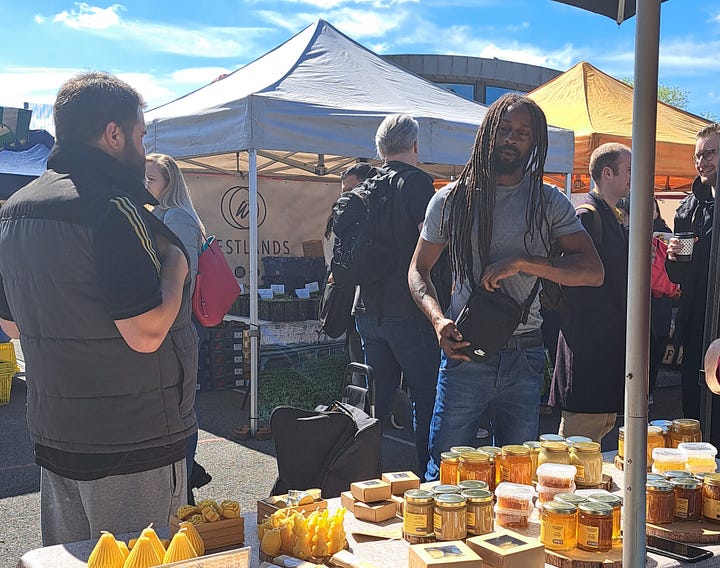
Sarah does point out that this isn’t world honey bee day it’s world bee day, (National Honey Day is in October). World Bee Day’s focus is on the widest possible range of bees, a call to action.
The UN monitor bee numbers; Honey bees aren’t going extinct, there’s never been more honey bees on earth as they're a kept species. Today is about wild bees who support the food chain and largely go unrecognised because as Sarah says, ‘‘they don’t make honey, and honey is money.’’ She adds; ‘‘Once you step out of the honey economy, you should be looking at ecology in the widest sense. That’s what world bee day is about, educating and asking, what can I do help?’’
Sarah states firmly that ‘‘Without wild bees, everything collapses. Each one is a niche, a pollinator’’ Bumble bees and solitary bees pollinate millions of things that support the food chain’’.
‘There’s a vast population of working insects; we’re happy to bite into an apple which has been pollinated by mason bees, which we’ve never seen or know anything about.’’
Wanting to know more about wild bees and setting out to find out is the subject of her latest book, The Wild Bee Handbook.
‘‘It nearly drove me mad’’, she laughs, ‘‘such a complex world of ecology, they’re not studied in the same way as honey bees so the experts have a lot of conflict in understanding their life cycles and I had to do an awful lot of research to construct what I call the 3 legged stool; 3 points of agreement before I decided a fact was a fact.’’
Sometimes I felt like a headline writer in The Sun, their lifecycles are so amazing. There’s a lot of sex in the bee world and some of it’s dirty.
The book is, is as she says, instructions for how to go about helping wild bees, even if you’re starting from scratch:-
What more can we do? The UN say;
planting a diverse set of native plants, which flower at different times of the year;
buying raw honey from local farmers;
buying products from sustainable agricultural practices;
avoiding pesticides, fungicides or herbicides in our gardens;
protecting wild bee colonies when possible;
sponsoring a hive;
making a bee water fountain by leaving a water bowl outside;
helping sustaining forest ecosystems;
raising awareness around us by sharing this information within our communities and networks; The decline of bees affects us all!
The British Beekeeping Association, celebrating its 150th anniversary this month has lots of information about tracking down local honey sellers.
Without bees we are nothing. In their book, A World Without Bees, authors Alison Benjamin and Brain McCallum describe the situation in Southern China, where farmers have to hand pollinate their fruit trees because pesticides have killed off their bees.
I asked Sarah, what would a world without bees look like?
You can find a free download from Sarah’s company, Bermondsey Street Bees on what to plant.
ONE LAST THING BEFORE YOU CLICK ON THE RECIPE
PLEASE; would you kindly hit the ❤️️ button below if you like my writing? It means so much to me to know that what I do is appreciated.
I’m sharing a link to a Nigel Slater recipe where the taste of the honey you use really does matter. Last year in Norfolk I bought a jar of lavender honey for the friend I was with. He used it to make the most incredible honey panna-cotta. You don’t need to use lavender honey for this recipe but please do use real honey. It will make all the difference.



My daughter needs to follow the Specific Carbohydrate Diet for her health issues. Cane sugar is not allowed but honey, a monosaccharide, is permitted. Because of this we use way more honey in our house than the average person, and I always make a point to buy local honey, usually from the bee keepers who attend my local market (I was the farmers' market manager for ten happy years and continue to shop there.). I do this for all the reasons mentioned in the article, and, yes, I pay more than from the supermarket because you get what you pay for. Raw local honey is worth every penny. It's also fun, as you noted, how much flavor variation there is season to season, bee keeper to bee keeper, and location to location. The segment on honey from the Netflix series Salt, Fat, Acid, Heat, really highlights this in a wonderful way.